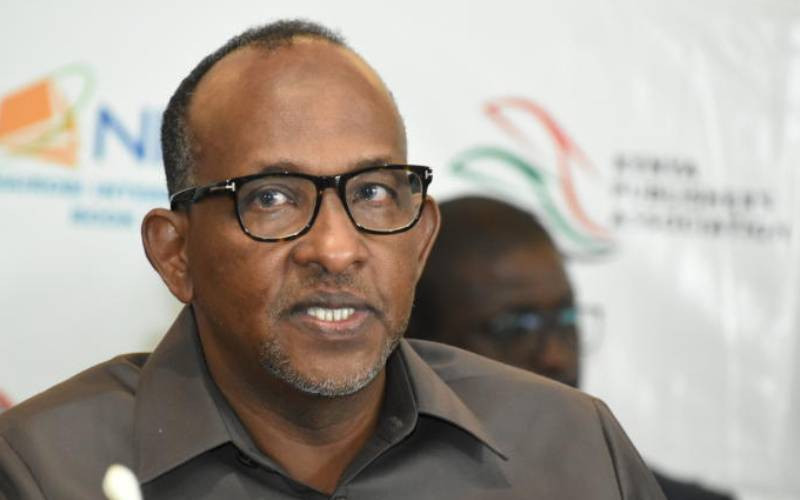Kenya: A two-year-old boy is among thousands of aliens detained in police stations across the country for months, raising fears of human rights abuses in the ongoing Operation Usalama Watch campaign.
The little boy is Congolese owing to his mother Pelezo Mpaka’s nationality: he has been held in the women’s cell at the Industrial Area Police Station for days.
But he has been to four other police stations around the city for several months, even as the State claims there are no foreigners still held in the country as detainees following an outcry from civil society which led to last month’s closure of a detention camp that had temporarily been set up at Kasarani Stadium.
“I have been in detention since February, no one wants to take me home,” Mpaka says from the Industrial Area Police Station. No charges have been preferred against her and her fear is that her baby could spend many more months in detention.
She has watched her fellow detainees leave, one after another; a teenage girl whom she had struck a friendship with was sent to a refugee camp just this week. Some civil society believe other aliens may have been moved to far-off police stations like Naivasha, claims that have been dismissed out of hand by the police.
“This is a humanitarian crisis,” says Ms Nazlin Umar, whose family started an online campaign against the violation of the aliens rights dubbed, #KasaraniIftar. The campaign sought to raise funds to buy foodstuff, clothing and even transport costs for the detainees. “It is disheartening to have detainees held for months without sending them home,” she adds. Kenya’s law requires that illegal immigrants, and indeed any other suspects, be charged in court within 24 hours of their arrest before they are repatriated or taken in as refugees.
Somalia’s case, however, is different since it is a war-torn country and its fleeing citizens would likely be victims of the lawlessness at home.
As such, illegal immigrants from the country would be treated as refugees. Umar, however, says several Somalis had been taken back home, a proposition The Standard on Sunday could not independently verify.
Kept at stadium
Umar’s campaign began at the start of Ramadhan to help Muslim faithful break the fast in the holy month. But the focus of the campaign quickly changed when it was discovered that several other nationalities had been netted and were kept at the Kasarani Stadium.
Most of the detainees were arrested in Eastleigh, the hotspot of several terror attacks where many Kenyans have been killed or injured, among the injured area MP Yussuf Hassan. Some of the detainees picked from the area were Mpaka and her son, alongside citizens of Ethiopia, Tanzania, Uganda and Somalia.
A 14-year-old primary school pupil, who was born in Mogadishu before her parents fled into Kenya, was also picked up in Eastleigh. A letter from her school, Ainsworth Primary, did not stop her from being separated from the relatives she was living with after she was arrested.
She begged to be taken to a refugee camp because she could not fathom life in her home in Mogadishu, which is partly controlled by the Al Shabaab.
“I am broken,” the little girl told reporters and human rights activists, after a vetting exercise ruled that her stay in Kenya was illegal. Somalia’s Parliament and its Presidential home, Kenya’s equivalent of State House, have also been targets in the latest round of terror attacks.
Stay informed. Subscribe to our newsletter
Najda Khan, a human rights activist, says there is everything wrong with the campaign. “This is terror by the State,” says Ms Khan, who argues that the Government needs to be clear on how to handle the illegal immigrants before their arrest.
Mpaka and her son have been in police custody even before the campaign was launched on April 2, meant to mop up illegal immigrants following a spike in terror activity across major towns, with Nairobi and Mombasa taking the brunt of grenade and bomb explosions.
When she was arrested, together with her son, the police took her to Gigiri Police Station before she was moved to Kasarani, Buru Buru and now the Industrial Area Station.
Police officers in the different stations have no idea that Mpaka has never been repatriated to her home country, much less a refugee camp.
An officer from Buru Buru told The Standard on Sunday that Mpaka and tens of other detainees had been deported, before we established that all had only been transferred and the movement kept as top secret between senior officers.
“We had about 20 detainees but they have all been sent back home,” said the officer who requested anonymity owing to the sensitivity of the aliens’ deportation. Senior officers at the police station also claim they did not know that the detainees had been transferred to different facilities, but rather the respective embassies had helped their citizens back home. “There have been delays in deporting the detainees we have been holding,” said a senior officer, adding, “We have been told there are no funds to pay for their transport home.” Inspector General of Police David Kimaiyo has also reported that all illegal immigrants that have previously been arrested had already been repatriated. The embassy of the DRC says it has no idea who Mpaka is and has no information about any of its citizens in Kenyan cells.
 The Standard Group Plc is a
multi-media organization with investments in media platforms spanning newspaper
print operations, television, radio broadcasting, digital and online services. The
Standard Group is recognized as a leading multi-media house in Kenya with a key
influence in matters of national and international interest.
The Standard Group Plc is a
multi-media organization with investments in media platforms spanning newspaper
print operations, television, radio broadcasting, digital and online services. The
Standard Group is recognized as a leading multi-media house in Kenya with a key
influence in matters of national and international interest.
 The Standard Group Plc is a
multi-media organization with investments in media platforms spanning newspaper
print operations, television, radio broadcasting, digital and online services. The
Standard Group is recognized as a leading multi-media house in Kenya with a key
influence in matters of national and international interest.
The Standard Group Plc is a
multi-media organization with investments in media platforms spanning newspaper
print operations, television, radio broadcasting, digital and online services. The
Standard Group is recognized as a leading multi-media house in Kenya with a key
influence in matters of national and international interest.







